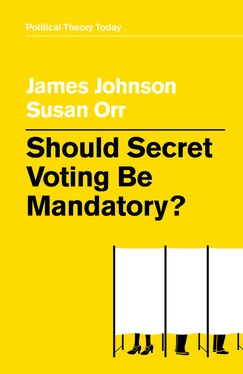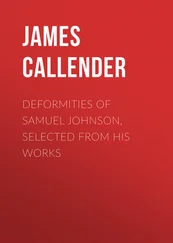1 Series title
2 Title page Should Secret Voting Be Mandatory? James Johnson Susan Orr polity
3 Copyright page Copyright page Copyright © James Johnson and Susan Orr 2020 The right of James Johnson and Susan Orr to be identified as Author of this Work has been asserted in accordance with the UK Copyright, Designs and Patents Act 1988. First published in 2020 by Polity Press Polity Press 65 Bridge Street Cambridge CB2 1UR, UK Polity Press 101 Station Landing Suite 300 Medford, MA 02155, USA All rights reserved. Except for the quotation of short passages for the purpose of criticism and review, no part of this publication may be reproduced, stored in a retrieval system or transmitted, in any form or by any means, electronic, mechanical, photocopying, recording or otherwise, without the prior permission of the publisher. ISBN-13: 978-1-5095-3815-7 ISBN-13: 978-1-5095-3816-4 (pb) A catalogue record for this book is available from the British Library. Typeset in 11 on 15 Sabon by Fakenham Prepress Solutions, Norfolk NR21 8NL Printed and bound in by CPI Group (UK) Ltd, Croydon The publisher has used its best endeavours to ensure that the URLs for external websites referred to in this book are correct and active at the time of going to press. However, the publisher has no responsibility for the websites and can make no guarantee that a site will remain live or that the content is or will remain appropriate. Every effort has been made to trace all copyright holders, but if any have been overlooked the publisher will be pleased to include any necessary credits in any subsequent reprint or edition. For further information on Polity, visit our website: politybooks.com
4 Dedication Dedication This book is for Esme Lavinia Maureen Orr Johnson in the hope that she enjoys a democratic future and in memory of her beloved Nana, Maureen Carol Orr (1943–2020).
5 Introduction Notes
6 1 The Clash of Inclusion and Integrity? Ideals and institutions Institutions Ideals Secret voting among political theorists: advocates Secret voting among political theorists: critics The strategic structure of the secret ballot The normative terrain The limits of the secret ballot Notes
7 2 A Precarious Institution Under Siege Elections before secret voting The rise of the “Australian ballot” Consequences and limits of the Australian ballot Back to the future and beyond Notes
8 3 Non-Domination in Elections Requires Mandatory Voting Too Two clarifications The standard case for mandatory voting – and ours Inclusion goes awry – the varieties, extent, and consequences of convenience voting The normative terrain Conclusion Notes
9 References
10 End User License Agreement
1 Cover
2 Contents
3 1 The Clash of Inclusion and Integrity?
1 ii
2 iii
3 iv
4 vii
5 ix
6 x
7 xi
8 xii
9 xiii
10 xiv
11 xv
12 xvi
13 xvii
14 105
15 1
16 2
17 3
18 4
19 5
20 6
21 7
22 8
23 9
24 10
25 11
26 12
27 13
28 14
29 15
30 16
31 17
32 18
33 19
34 20
35 21
36 22
37 23
38 24
39 25
40 26
41 27
42 28
43 29
44 30
45 31
46 32
47 33
48 34
49 35
50 36
51 37
52 38
53 39
54 40
55 106
56 107
57 41
58 42
59 43
60 44
61 45
62 46
63 47
64 48
65 49
66 50
67 51
68 52
69 53
70 54
71 55
72 56
73 57
74 58
75 59
76 60
77 61
78 62
79 63
80 64
81 65
82 66
83 67
84 68
85 69
86 70
87 71
88 72
89 73
90 74
91 75
92 108
93 109
94 110
95 76
96 77
97 78
98 79
99 80
100 81
101 82
102 83
103 84
104 85
105 86
106 87
107 88
108 89
109 90
110 91
111 92
112 93
113 94
114 95
115 96
116 97
117 98
118 99
119 100
120 101
121 102
122 103
123 104
124 111
125 112
126 113
127 114
128 115
129 116
130 117
131 118
132 119
133 120
134 121
Should Secret Voting Be Mandatory?
James Johnson
Susan Orr
polity
Copyright © James Johnson and Susan Orr 2020
The right of James Johnson and Susan Orr to be identified as Author of this Work has been asserted in accordance with the UK Copyright, Designs and Patents Act 1988.
First published in 2020 by Polity Press
Polity Press
65 Bridge Street
Cambridge CB2 1UR, UK
Polity Press
101 Station Landing
Suite 300
Medford, MA 02155, USA
All rights reserved. Except for the quotation of short passages for the purpose of criticism and review, no part of this publication may be reproduced, stored in a retrieval system or transmitted, in any form or by any means, electronic, mechanical, photocopying, recording or otherwise, without the prior permission of the publisher.
ISBN-13: 978-1-5095-3815-7
ISBN-13: 978-1-5095-3816-4 (pb)
A catalogue record for this book is available from the British Library.
Typeset in 11 on 15 Sabon by Fakenham Prepress Solutions, Norfolk NR21 8NL
Printed and bound in by CPI Group (UK) Ltd, Croydon
The publisher has used its best endeavours to ensure that the URLs for external websites referred to in this book are correct and active at the time of going to press. However, the publisher has no responsibility for the websites and can make no guarantee that a site will remain live or that the content is or will remain appropriate.
Every effort has been made to trace all copyright holders, but if any have been overlooked the publisher will be pleased to include any necessary credits in any subsequent reprint or edition.
For further information on Polity, visit our website: politybooks.com
This book is for Esme Lavinia Maureen Orr Johnson in the hope that she enjoys a democratic future and in memory of her beloved Nana, Maureen Carol Orr (1943–2020).
The future of democracy seems dire. Freedom House, an organization that assesses governments around the world, recently proclaimed “Democracy is in retreat.” 1They base this gloomy proclamation on persistent decline in expert assessments of the functioning of democratic institutions and the extent of democratic freedoms across both “new” democracies, such as Hungary and Venezuela, and “consolidated” democracies, such as the United States and United Kingdom. The Freedom House assessment parallels the appraisals of democratic citizens. A “mega-study” of public opinion on democracy that combines more than four million observations from 3,500 country surveys documented a 25-year high of 58 percent of respondents expressing dissatisfaction with democracy in 2020. 2The rise of right-wing populism in Hungary, Poland, Brazil, and India, the Brexit campaign, and the election of Donald Trump further serve to heighten concerns about democratic governance. These political events and trends have prompted academic assessments with alarming titles such as How Democracies Die (Levitsky and Ziblatt 2018), Crises of Democracy (Przeworski 2019), and How Democracy Ends (Runciman 2018).
Читать дальше












